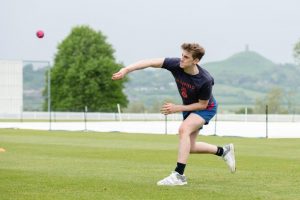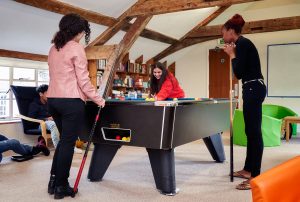WHEN computer expert Mark Hills got a call from Los Angeles at 9am on a Monday morning, the last thing he expected to hear was that he’d won an Emmy award, the small screen equivalent of an Oscar.
Moments later, the former Ripon Grammar School pupil and his business partner Marc Bakos – who together created a ground-breaking audio production system credited with revolutionising the industry – were screaming at each other down the phone.
Barely able to believe they had won the highest honour for work in television for their role in the creation of innovative soundtracks for hit TV series such as The Crown, The Queen’s Gambit, The Flight Attendant and Line of Duty, Mark says: “It was out of the blue.”
Mark, 41, who left RGS in 1999 to study computer science at university, is no stranger to awards.
In 2014, he was part of a large team at British visual effects company Framestore which won both the Oscar and Bafta for best visual effects for Gravity, starring George Clooney and Sandra Bullock.
But this Emmy – an elite Primetime version, which is one of the most sought-after of the top TV accolades – has his name on it: “This is different because it’s for something I conceived, and it has my name engraved on it. I’m very proud,” said Mark, whose partner also received one of his own.
“It’s great that as a technologist these awards are within reach. We
hadn’t had any previous contact with the Television Academy, the judges
seemed to be really impressed with what we had done.”
Their Cleanfeed system, which works for radio, TV and film, connects studios together so that the quality sounds as if it’s all being recorded in the same room: “We made this kind of technology accessible in a way it wasn’t before,” explains Mark.
The pair have certainly made a huge impact. Impressed Emmy judges credited their pioneering new audio production for changing the way post-production studios are being built.
But Mark says it was thanks to being ahead of the curve that their business
was ready to fulfil the needs of the pandemic.
After 13 years working at Framestore and in need of a break, he resigned in January 2020, working out his notice until March.
“I left the office on the Thursday, with no job to go to, and the World Health Organisation announced the global pandemic on the Friday, so suddenly any travel options were off the table.”
Mark, who used to be DJ for RGS school discos and went on to work in radio, had been developing a side business in his spare time, creating software for radio stations to enable broadcasters to make programmes from home.
He first got hooked on the idea of digital audio inside computers back in the Eighties when along with his father, Peter, he coded a sound sampler on an old 8-bit computer.
With the advent of the internet, Mark soon began dreaming of presenting a radio station breakfast show from his bedroom.
But what, he confesses, seemed like an absurd idea at that time had become not just a reality but a necessity in March 2020.
Suddenly, everyone was trying to work out how best to produce shows and do interviews away from studios in the pandemic and he got a call from the BBC, who wanted to use Cleanfeed.
“I realised the need was pressing and the timing meant I was going to be at home, so it was a great project to work on.
“Having just left Framestore, I also realised its potential in audio post-production for film and TV, where the sound you hear is often not recorded on set but recreated afterwards.
“There has been a lot of cross-pollination, with features and ideas from radio adapted for film and TV. Ideas developed for podcasters, for example, have helped improve the functionality used in film.
“It’s the intersection of creativity and technology that really excites me,” he says.
For now, Cleanfeed is tailored towards professional use, but a free version does enable people outside the industry to do more from home: “It provides a straightforward way for podcasters, for example, to collaborate from their homes.
“We want to reach more people and keep growing Cleanfeed,” he says. “It’s
always been our ambition to enable people to do something they couldn’t do
before.”
His parents, Greta and Peter, who live in Sharow, outside Ripon, say they are very proud of Mark’s achievement: “We bought our first home computer, a Sinclair ZX Spectrum, when Mark was three years old and his teacher at Holy Trinity School couldn’t understand why he used capital letters when learning to write, but we knew he was using those which he recognised from the keyboard!” says Greta.
Mark remains a computer coder at heart, he says, and still finds it difficult to believe he has actually won a coveted Emmy, which is currently propped up on top of a loudspeaker in his London home.
A few months after that Monday morning phone call, Mark recalls how he found himself at the plush Maybourne hotel in Beverly Hills, where he was presented with his award by actress Kirsten Vangsness at a glittering ceremony.
Wide-eyed hotel staff looked astounded when he arrived, dressed in shorts and T-shirt, in a rented Nissan car with a dented bumper, pulling up next to a Rolls Royce with personalised number plate.
“We were staying an hour and a half away in the mountains, so we brought our suits in a bag to change into,” says Mark.
When he appeared back at reception after the ceremony, dressed in a smart suit and clutching his Emmy, the same staff were taken aback: “Talk about under promising and over delivering,” joked one.
“Looking back on it, the whole thing has been an extraordinary experience,” says Mark, the boy from Ripon Grammar School who has just won an Emmy.
Categories: Ripon Grammar School







